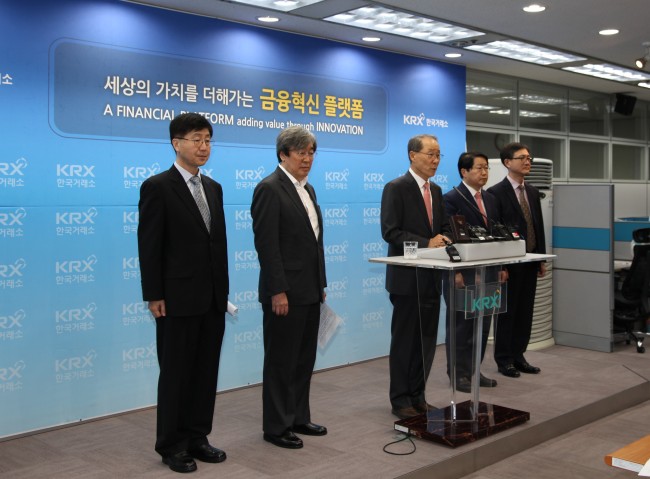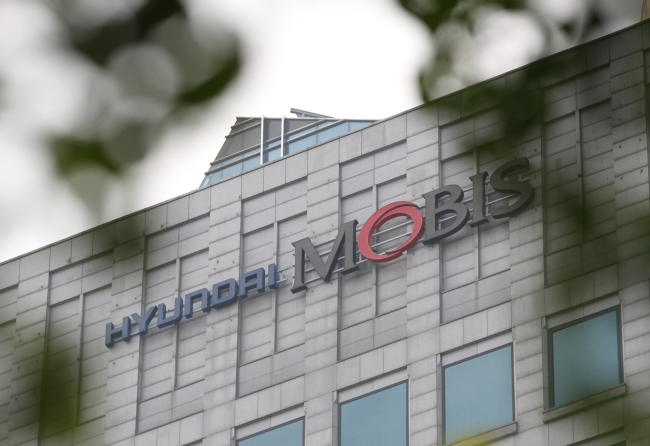Advocacy group urges policy for defense against hostile activist funds
By Son Ji-hyoungPublished : May 16, 2018 - 16:16
The nonprofit Korea Listed Companies Association, which represents some 2,000 listed companies, urged the government Wednesday to come up with a policy to allow companies to defend against hostile moves from foreign activist shareholders.
Such attempts have undermined Korean firms’ efforts to embark on long-term growth and instead lead to them sticking to short-term gains, said Jung Koo-ryong, chairman of the advocacy group, in a press conference held at the Korea Exchange headquarters on Wednesday.
Such attempts have undermined Korean firms’ efforts to embark on long-term growth and instead lead to them sticking to short-term gains, said Jung Koo-ryong, chairman of the advocacy group, in a press conference held at the Korea Exchange headquarters on Wednesday.

“Korean firms have looked to long-term sustainability and to enhance corporate value, and some activist funds have posed a serious threat to their corporate management,” Jung said.
“Companies trading on stock markets have been exposed to capital-rich activist funds’ intervention in business management, resulting in local corporations’ pursuit of instant gains, instead of long-term performance. We have experienced fallout from (the funds’ influence on the companies).”
Jung urged Korea to permit listed companies to use anti-takeover tactics, such as issuing multiple-class stocks with different voting rights and a “poison pill” maneuver, used to make stocks unfavorable for the acquirer. Jung said such corporate maneuvers are “widely used in major nations across the world.”
Jung at the same time called on Korea to remove some regulations, including one that prohibits major shareholders from having more than 3 percent voting rights in appointing auditors.
Embattled Hyundai Motor Group has been the recent target of an activist fund’s attack, he added.
The automaking conglomerate looks to reform governance structure in a forthcoming general shareholders meeting slated for May 29.
In March, Hyundai Motor unveiled plans to change its governance structure. According to the plan, Hyundai Motor would spin off Hyundai Mobis’ after-sales and module divisions and merge them with Hyundai Glovis. In this way, Hyundai Motor Chairman Chung Mong-koo and his son Vice Chairman Chung Eui-sun would acquire all Mobis shares held by Kia Motors, Hyundai Glovis and Hyundai Steel.
Fair Trade Commission chief Kim Sang-jo hailed the plan, partly due to their willingness to pay a transfer tax worth 1 trillion won ($930 million) in the process of a structure cleanup.
“Companies trading on stock markets have been exposed to capital-rich activist funds’ intervention in business management, resulting in local corporations’ pursuit of instant gains, instead of long-term performance. We have experienced fallout from (the funds’ influence on the companies).”
Jung urged Korea to permit listed companies to use anti-takeover tactics, such as issuing multiple-class stocks with different voting rights and a “poison pill” maneuver, used to make stocks unfavorable for the acquirer. Jung said such corporate maneuvers are “widely used in major nations across the world.”
Jung at the same time called on Korea to remove some regulations, including one that prohibits major shareholders from having more than 3 percent voting rights in appointing auditors.
Embattled Hyundai Motor Group has been the recent target of an activist fund’s attack, he added.
The automaking conglomerate looks to reform governance structure in a forthcoming general shareholders meeting slated for May 29.
In March, Hyundai Motor unveiled plans to change its governance structure. According to the plan, Hyundai Motor would spin off Hyundai Mobis’ after-sales and module divisions and merge them with Hyundai Glovis. In this way, Hyundai Motor Chairman Chung Mong-koo and his son Vice Chairman Chung Eui-sun would acquire all Mobis shares held by Kia Motors, Hyundai Glovis and Hyundai Steel.
Fair Trade Commission chief Kim Sang-jo hailed the plan, partly due to their willingness to pay a transfer tax worth 1 trillion won ($930 million) in the process of a structure cleanup.

But US hedge fund Elliott has urged shareholders to vote against the plan in the meeting, saying the conglomerate’s plan is “unfair to shareholders” and failed to come up with measures to address “significant valuation discounts and underperformance” at Hyundai Mobis, Hyundai Motor and Kia.
While Elliott’s position was echoed by some proxy advisers, the automaker contended the measure is aimed at benefiting Mobis investors and securing long-term strategies to prop up new growth business engines.
Such “hostile” moves are nothing new to Korean firms.
Sovereign Asset Management, a Dubai-based investor holding 14.82 percent of refiner SK Corp., sold off its entire stake in 2005 worth $900 million, seeing its value jump more than fivefold after a two-year spat surrounding the conglomerate’s governance structure reform. Likewise, US investor Carl Icahn in 2007 sold off KT&G shares for $460 million, seeing some $120 million in capital gains.
By Son Ji-hyoung
(consnow@heraldcorp.com)
While Elliott’s position was echoed by some proxy advisers, the automaker contended the measure is aimed at benefiting Mobis investors and securing long-term strategies to prop up new growth business engines.
Such “hostile” moves are nothing new to Korean firms.
Sovereign Asset Management, a Dubai-based investor holding 14.82 percent of refiner SK Corp., sold off its entire stake in 2005 worth $900 million, seeing its value jump more than fivefold after a two-year spat surrounding the conglomerate’s governance structure reform. Likewise, US investor Carl Icahn in 2007 sold off KT&G shares for $460 million, seeing some $120 million in capital gains.
By Son Ji-hyoung
(consnow@heraldcorp.com)



![[Exclusive] Korean military set to ban iPhones over 'security' concerns](http://res.heraldm.com/phpwas/restmb_idxmake.php?idx=644&simg=/content/image/2024/04/23/20240423050599_0.jpg&u=20240423183955)
![[AtoZ into Korean mind] Humor in Korea: Navigating the line between what's funny and not](http://res.heraldm.com/phpwas/restmb_idxmake.php?idx=644&simg=/content/image/2024/04/22/20240422050642_0.jpg&u=)



![[Graphic News] 77% of young Koreans still financially dependent](http://res.heraldm.com/phpwas/restmb_idxmake.php?idx=644&simg=/content/image/2024/04/22/20240422050762_0.gif&u=)

![[Herald Interview] Why Toss invited hackers to penetrate its system](http://res.heraldm.com/phpwas/restmb_idxmake.php?idx=644&simg=/content/image/2024/04/22/20240422050569_0.jpg&u=20240422150649)





![[Exclusive] Korean military to ban iPhones over security issues](http://res.heraldm.com/phpwas/restmb_idxmake.php?idx=652&simg=/content/image/2024/04/23/20240423050599_0.jpg&u=20240423183955)



![[Today’s K-pop] Ateez confirms US tour details](http://res.heraldm.com/phpwas/restmb_idxmake.php?idx=642&simg=/content/image/2024/04/23/20240423050700_0.jpg&u=)